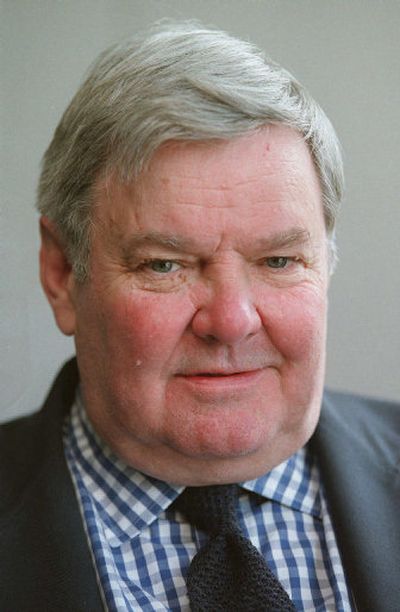R.W. Apple Jr. dies at 71

NEW YORK – R.W. Apple Jr., the colorful New York Times correspondent who charted the fall of Richard Nixon and covered wars from Vietnam to the Persian Gulf while having a parallel career as a food and travel writer, died Wednesday. He was 71.
Apple died in Washington after a long bout with thoracic cancer, the newspaper said.
His last words to Times readers came in a piece in last Sunday’s paper about food and travel destinations in Singapore.
“He was himself to the last,” New York Times Executive Editor Bill Keller said in a statement to the staff.
“From his sickbed he hammered out his last words to readers … negotiated details of the menu and music for his memorial service, followed the baseball playoffs and the latest congressional scandal with relish,” Keller said.
Apple joined the Times in 1963 after working for the Wall Street Journal and NBC News. Author David Halberstam, in his 1979 book on the media, “The Powers That Be,” described him in his early Times years as “a talented young reporter whose star was still ascending, hustling, brash, full of himself, very quick and very energetic.”
He covered the Vietnam and Persian Gulf Wars, the Iranian revolution and the collapse of Eastern Bloc governments.
As national political correspondent from 1970 to 1976, he also extensively chronicled the Watergate scandal.
“It was a tragedy in three acts,” Apple wrote in the lead of his story about Nixon’s resignation in August 1974.
“In 1972, Richard M. Nixon – a man who had often failed, who had been derided by the fashionable and the intellectual, who had made and remade himself into a winner – arrived at the pinnacle of his career,” he wrote. “In 1973, he found himself besieged by his enemies, forced onto the defense. And in 1974, he fell from power, humiliated as no predecessor has ever been.”
Sen. John McCain of Arizona hailed Apple on Wednesday as “one of the finest journalists and one of the dearest friends I have ever had.” They had met in July 1967, when Apple was on hand as fire swept the USS Forrestal in Vietnam’s Gulf of Tonkin, killing more than 130 servicemen.
McCain, a lieutenant commander, barely escaped death that day and was quoted in Apple’s story. Three months later, Apple wrote about him again when McCain became a POW in North Vietnam.
Apple’s epicurean side was evident in his many lighter pieces on travel and food. Known as “Johnny,” for Johnny Appleseed, he wrote about everything from hot dogs in Chicago to bacon in Wisconsin.
“Vidalias are to run-of-the-mill onions as foie gras is to chopped liver,” he wrote in 1998.
He is survived by his wife, Betsey, his longtime travel companion who was a fixture in his many first-person articles.